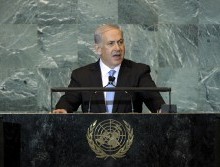The Israeli national elections are expected to be a year early after the Israeli Cabinet on Monday gave the go-ahead to begin the process of moving the vote up to September 4 of this year. The Israeli vote is now expected to come two months before elections in the United States and amid questions over how to handle the Iranian nuclear program and the Middle East peace process.
The Knesset (Israeli parliament) is a coalition system in which multiple parties can form and dissolve the government. The new election will put the premiership of current-Prime Minister Benjamin Netanyahu on the line, as the leader of the ruling party in the coalition is usually named the prime minister.
Despite that, Netanyahu actually pushed for the decision to call elections more than a year ahead of time. According to a press release from the Prime Minister’s Office, Netanyahu cited brewing political trouble within the government as the reason to move the vote forward.
“It is no secret that with the start of the government’s fourth year, the coalition’s stability is fraying somewhat, and that there has also been a lack of stability between and within the parties,” Netanyahu was quoted as telling the Cabinet on Monday.
“…We live in a country that needs political stability. I would have been very happy if we could have completed the term, which was also my goal. To my regret, this instability is calling this into question; therefore, it seems to me that the right thing to do is to go for a brief election campaign.”
Netanyahu promised that should he win re-election he plans to “form as broad a government as possible in order to create stability and successfully lead the State of Israel against the great challenges we still face.”
The Israeli political system is extremely diverse. The current coalition is a right-leaning government that includes religious parties, Netanyahu’s center-right Likud party and the center-left Atzmaut bloc.
That variety makes forming a coalition a complicated process with a wide-range of political interests to be considered. The opposition is currently led by the center-left Kadima party, although it’s left bloc-leadership is being challenged by other parties.
(By Joshua Spurlock, www.themideastupdate.com, May 7, 2012)

